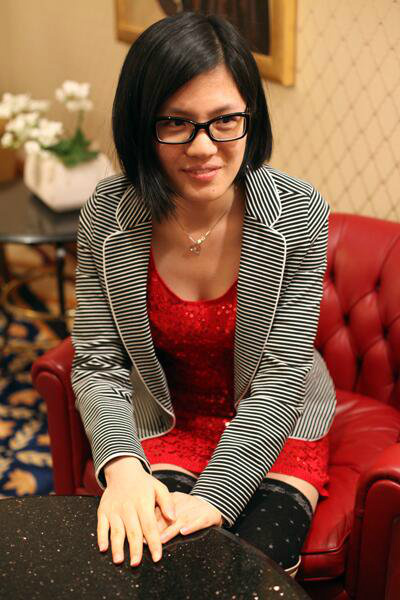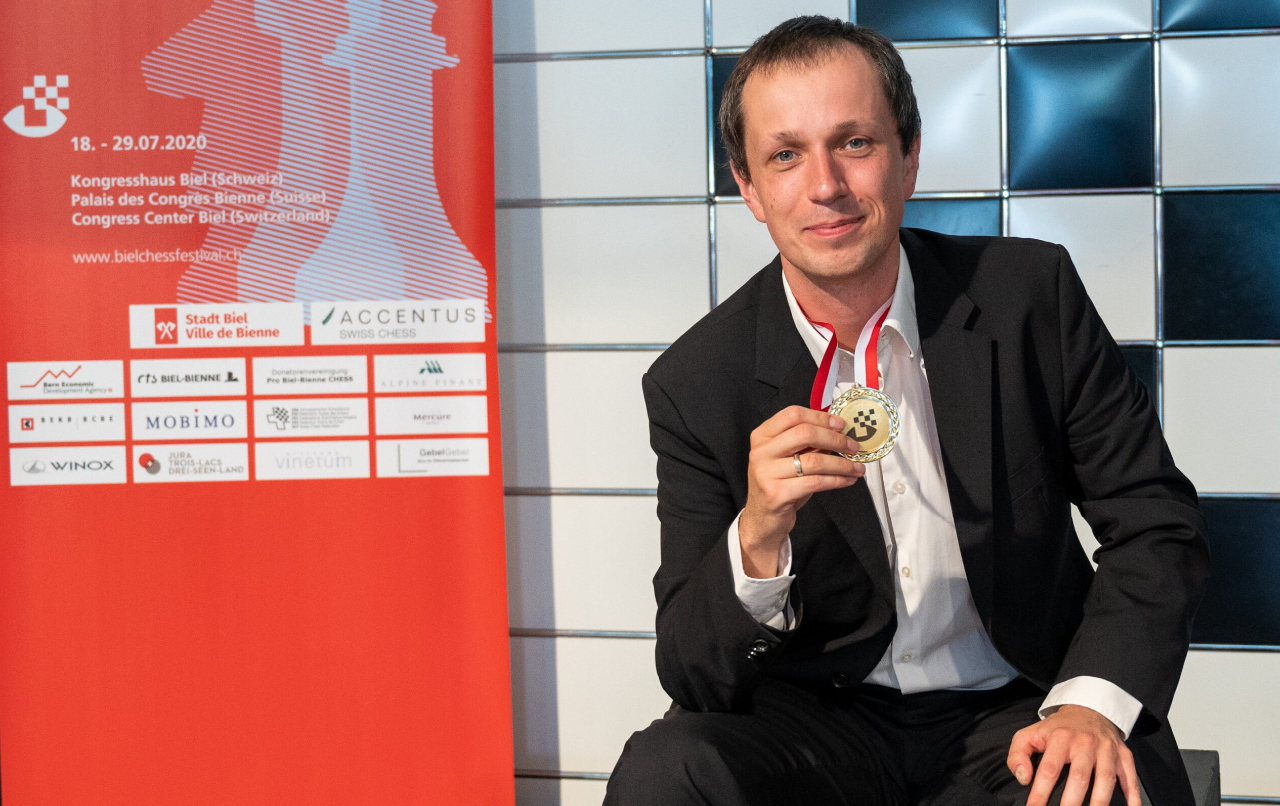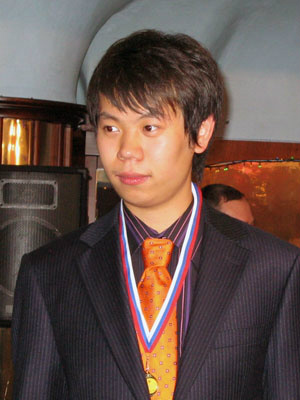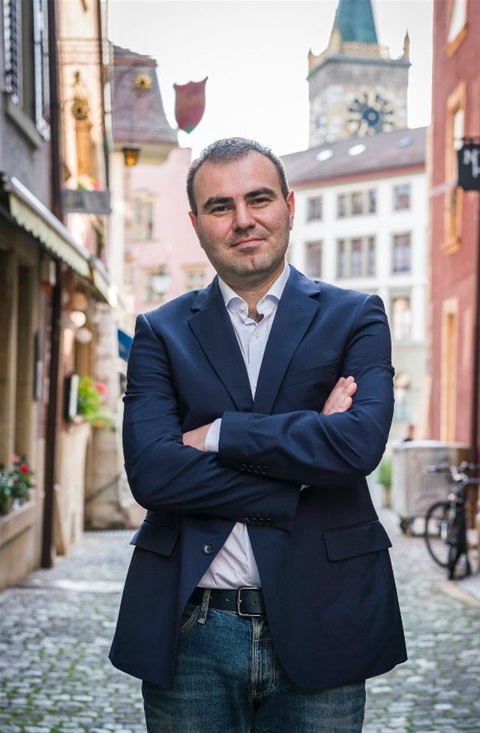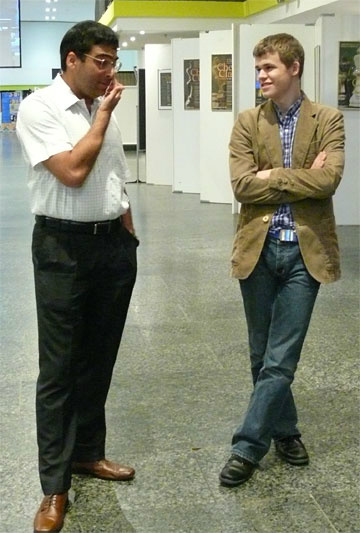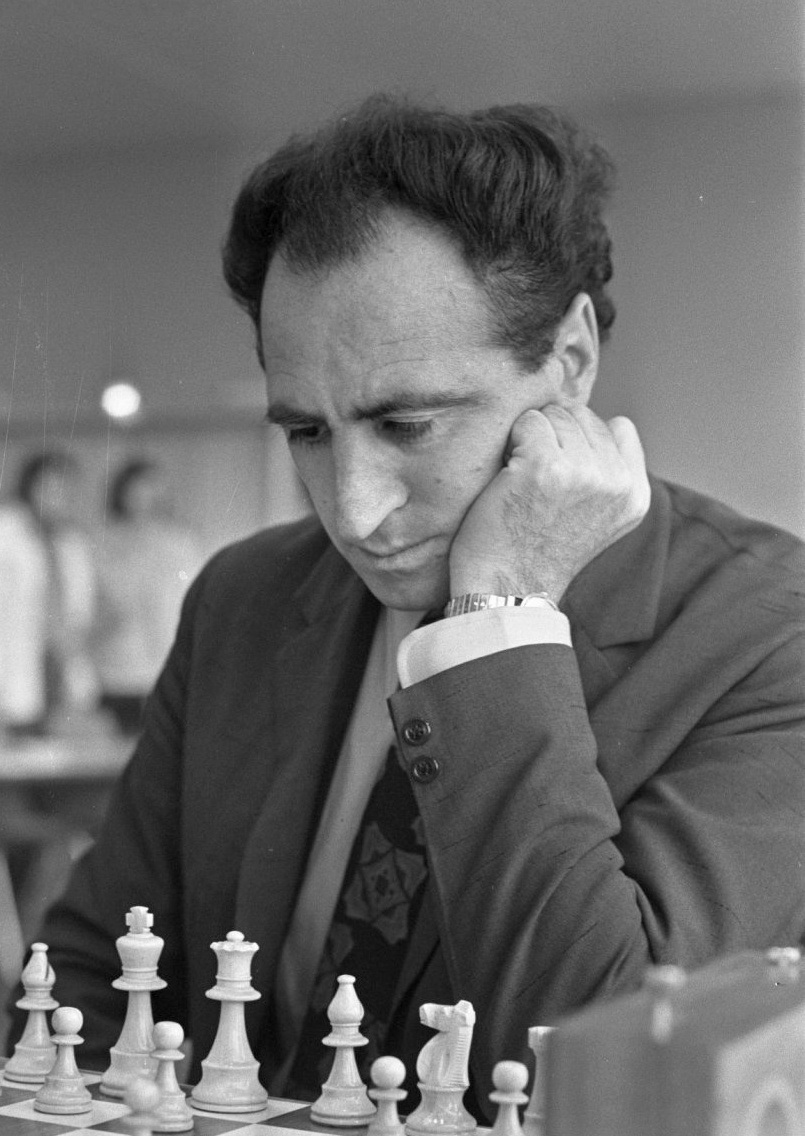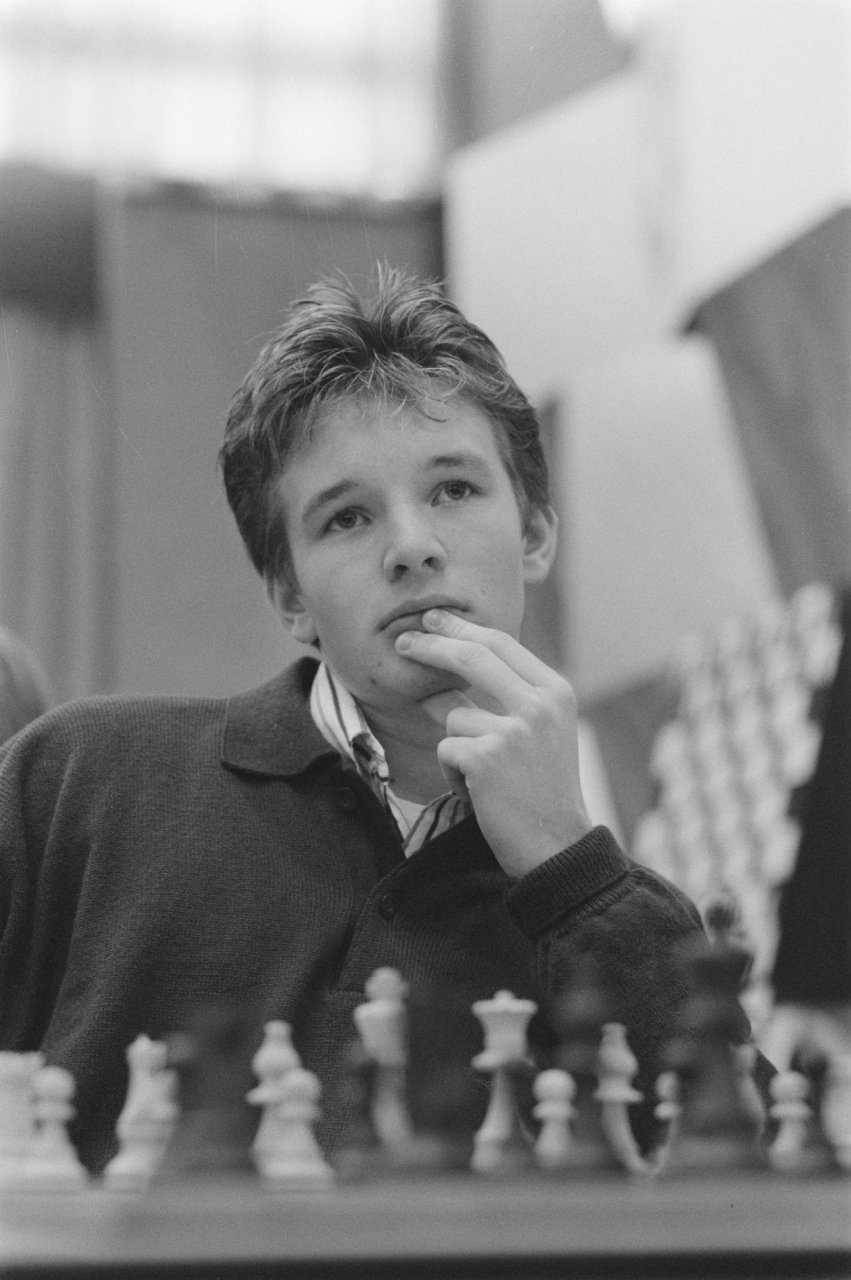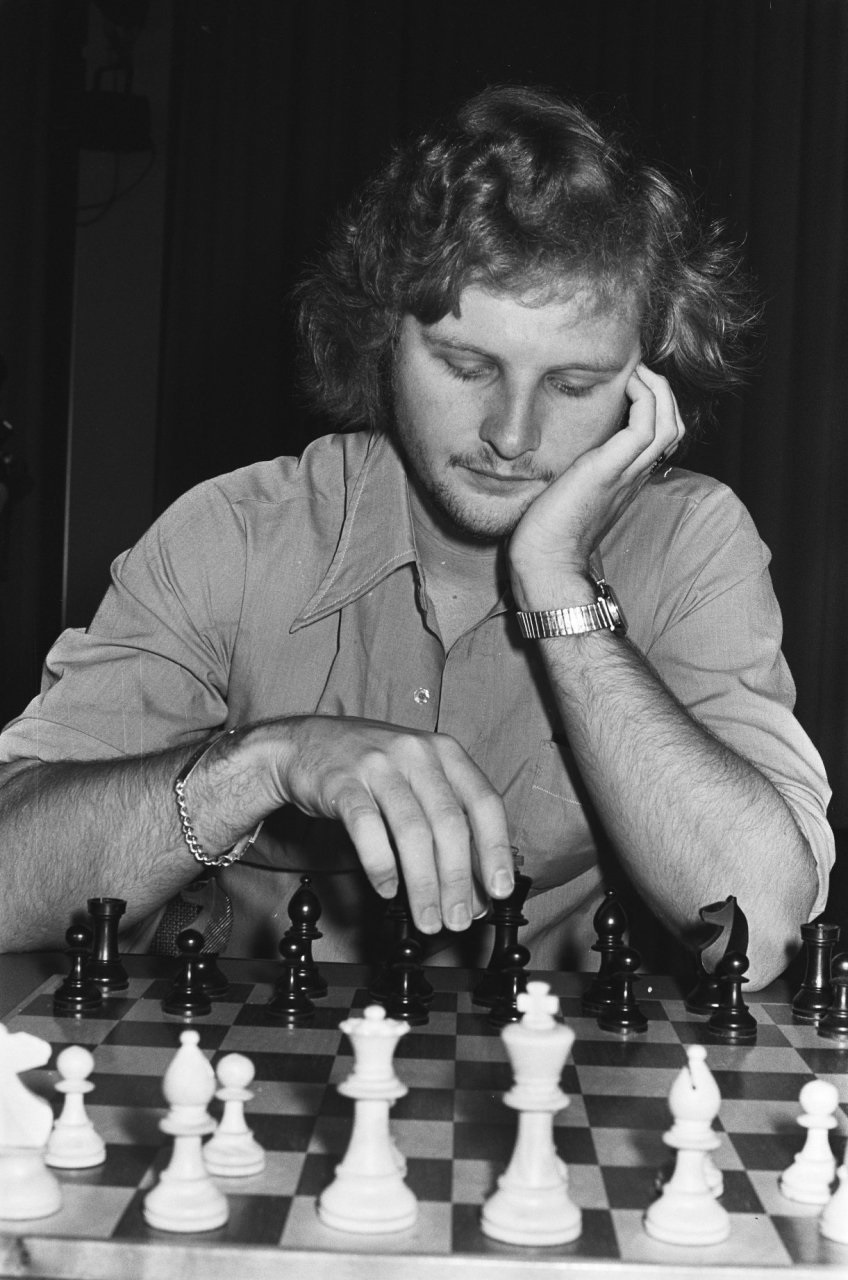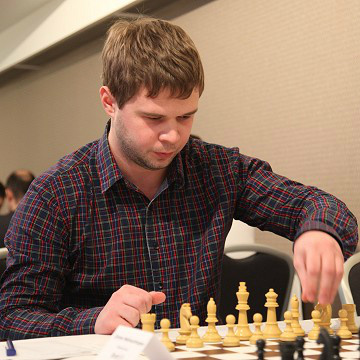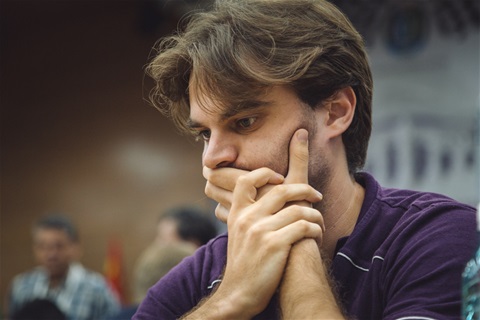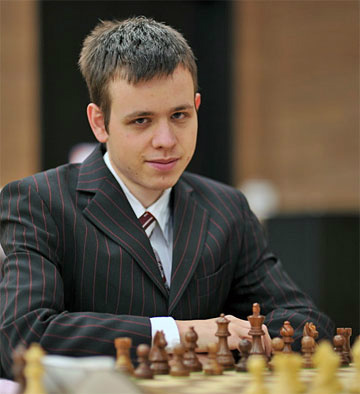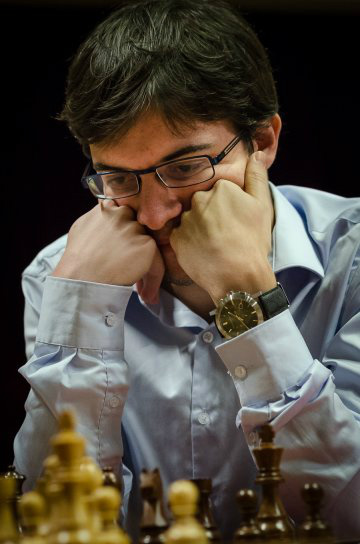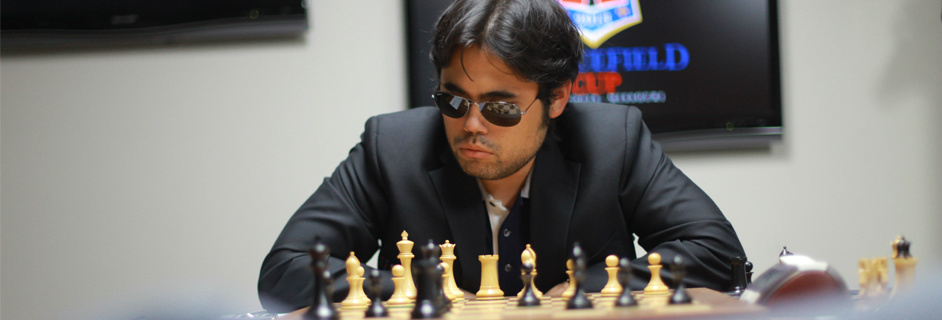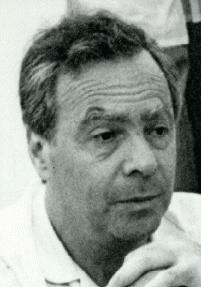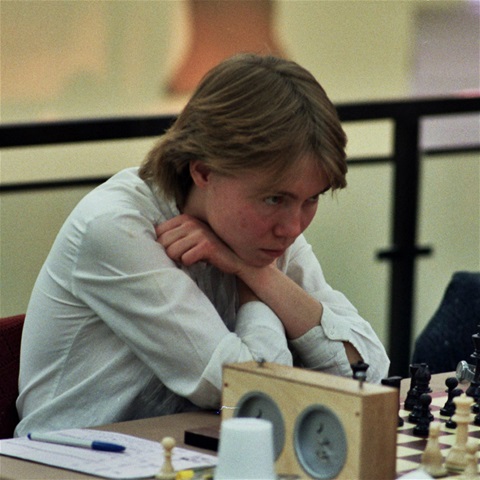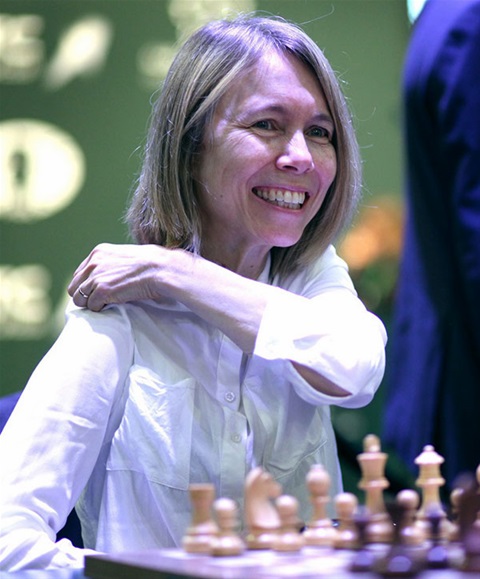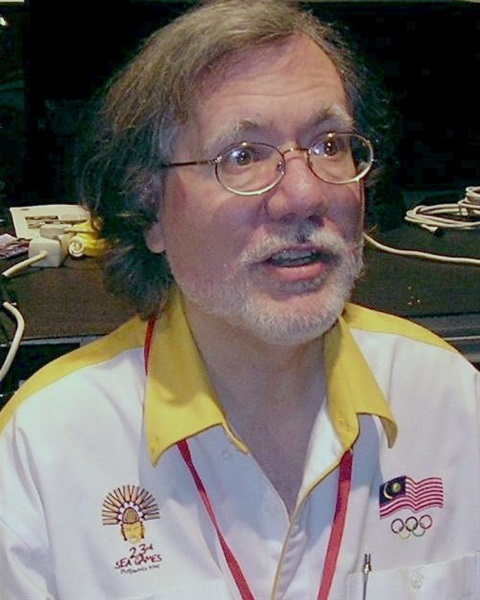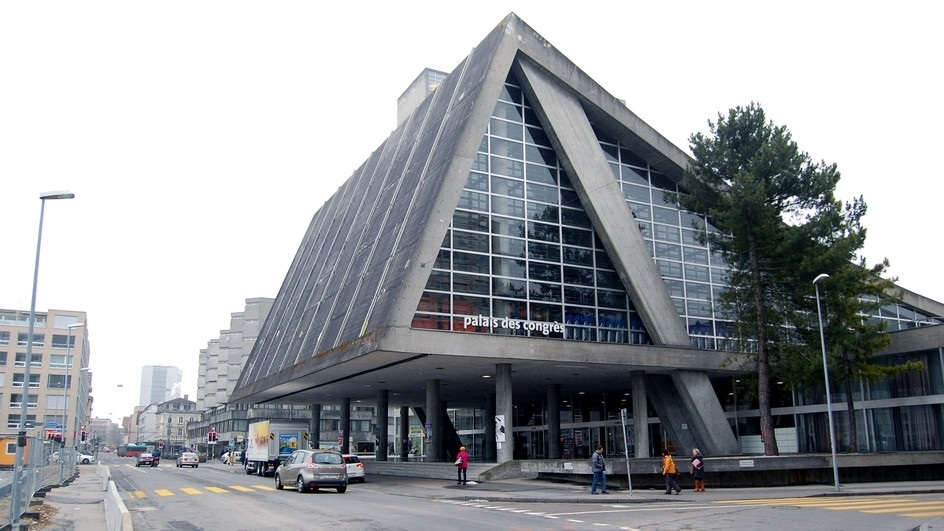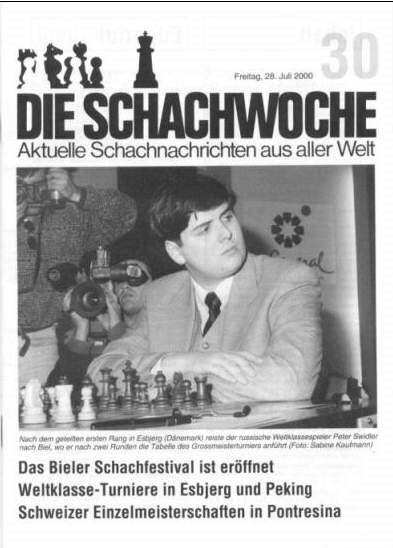Hou Yifan, the first women to triumph at Biel GM Tournament. Photo: Anastasiya Karlovich, 31 Jan 2014 in Switzerland, Hou Yifan giving a clock simul during the ZCC
International Grandmaster Tournament Biel Albo d' Oro
1976 INTERZONAL Bent Larsen (DEN), surpassing three former
World Chess Champions from the USSR, namely Petrosian, Tal, and Smyslov, plus Portisch, Hübner, R. Byrne, Geller, Gulko, etc.
1977 Anthony Miles (ENG)
1978 No GM tournament
1979 Viktor
Korchnoi (SUI)
1980 Yehuda Grünfeld (ISR)
1981 Eric Lobron (FRG-GER); Vlastimil Hort (CSSR)
1982 John Nunn (ENG); Florin Gheorghiu (ROM)
1983 Anthony Miles (ENG); John Nunn (ENG)
1984 Vlastimil Hort (CSSR); Robert Hübner (FRG-GER) jointly **
1985 INTERZONAL Rafael Vaganian (USSR-ARMENIA)
1986 Lev Polugaevsky (USSR); Eric Lobron (FRG-GER)
1987 Boris Gulko (USA)
1988 Ivan Sokolov (YUG); Boris Gulko (USA)
1989 Vassily Ivanchuk (USSR); Lev Polugaevsky (USSR)
1990 Anatoly Karpov (USSR)
1991 Alexej Shirov (LAT)
(he played for that tournament still under the
Soviet flag after turbulent negotiations between Fide, the involved Federations and the Organizers of Biel. Shirov later played for Spain; after playing for Latvia again, re-switching to the Spain Federation)
1992
Anatoly Karpov (RUS)
1993 INTERZONAL in swiss system Boris Gelfand (BLR, later ISR)
1994 Viktor Gavrikov (SUI)
1995 Alexej Dreev (RUS)
1996 Anatoly Karpov (RUS); Vadim Milov (SUI)
1997 Viswanathan
Anand (IND)
1998 Mladen Palac (CRO)
1999 Jeroen Piket (NED)
2000 Peter Svidler (RUS)
2001 Viktor Korchnoi (SUI) oldest winner at 70 and 4 mths, above Svidler, Gelfand, Grischuk,
etc.
2002 Ilya Smirin (ISR)
2003 Alexander Morozevich (RUS)
2004 Alexander Morozevich (RUS)
2005 Boris Gelfand (ISR); Andrei Volokitin (UKR) jointly **
2006 Alexander Morozevich (RUS)
2007 Magnus Carlsen (NOR) * youngest winner at 16 and a half
(after two rapids and two blitz, Armageddon vs. Alexander Onischuk)
2008 Evgeny Alekseev (RUS) *
(after two rapids, second blitz vs. Leinier Dominguez
Perez)
2009 Maxime Vachier-Lagrave (FRA)
2010 Fabiano Caruana (ITA) *
(three-way-tie between Ngoc Truongson Nguyen, Fabiano Caruana, and Maxime Vachier-Lagrave. Semifinal Caruana beats Vachier after two blitz in Armageddon game.
Final: Caruana beats Ngoc, seeded directly to the final as best player according to Sonneborn-Berger points, in rapid 1.5-0.5)
2011 Magnus Carlsen (NOR)
2012 Wang Hao (CHN), above the world's no.1 Carlsen as sole runner-up, Giri,
Nakamura, etc.
2013 (Oliver Breisacher Memorial) Maxime Vachier-Lagrave (FRA) *
(four-way-tie: Etienne Bacrot, Maxime Vachier-Lagrave, Alexander Moiseenko, and Ding Liren. Semifinal Vachier vs. Ding Liren 2-0 blitz,
Moiseenko vs. Bacrot 2-0 blitz. Final: Vachier-Lagrave wins play-off vs. Moiseenko 1.5-0.5)
2014 (Hans Suri Memorial) Maxime Vachier-Lagrave (FRA)
2015 Maxime Vachier-Lagrave (FRA)
2016 No GM tournament
2017
Hou Yifan (CHN)
2018 Shakhriyar Mamedyarov (AZE), above the reigning World Champion and the world's no.1, Carlsen, as sole runner-up
2019 GM Triathlon: Combined format consisting of 7 Classical, 7 Rapid,
and 14 Blitz games Vidit Santosh Gujrathi (IND)
2020 GM Triathlon: Combined format consisting of 7 Classical, 7 Rapid, and 14 Blitz games Radoslaw Wojtaszek (POL)
2021 GM Triathlon:
Combined format consisting of 7 Classical, 7 Rapid, and 14 Blitz games Gata Kamsky (USA)
2022 GM Triathlon: Combined format consisting of 7 Classical, 7 Rapid, and 14 Blitz games Lê Quang Liêm (VIE)
* winner after play-off speed games (rapid, blitz and / or Armageddon): from the edition of 2007 up to 2015, the regulations scheduled a speed play-off, if two or more players finished equal first
** equal tie-break Sonneborn-Berger scoring, both players were declared as ex aequo winners by the organizers (in all other cases, if two joint winners, the player first written in bold is winner on tie-break-scoring;
unless a speed play-off was held as in 2007, in 2008, in 2010, and in 2013)
Regulations in 2018: If two or more players are tied for first, mathematical tie-breaks will be used: 1. Sonneborn-Berger, 2. Direct Encounters (Quotation
from Official Website)
SINCE 1992 NO ADJOURNED GAMES AT BIEL GM TOURNAMENT
2011 – 2013 SPECIAL SCORING IN EFFECT: 3 POINTS PER WIN; 1 POINT PER DRAW
Magnus Carlsen would have
won under conventional scoring rules instead of Wang Hao in 2012, Etienne Bacrot would have won instead of compatriot Maxime Vachier-Lagrave in 2013
SINCE 2019, the format of the long-standing Grandmaster Tournament (GMT) has switched to a so-called Grandmaster TRIATHLON, with a rather confusing combined points scoring system of 7 Classical, 7 Rapid, and 14 Blitz games, that means a total of 28 chess games in 3 sets of round robin. The points are added up for an overall ranking as follows:
2019 (points scoring):
3 points for a win; 1 point for a draw; 0 point for a loss in Classical chess
2 points for a win; 1 point for a draw; 0 point for a loss in Rapid chess
1 point for a win; ½ point for a draw; 0 point for a loss in Bitz chess
since 2020 (points scoring):
4 points for a win; 1½ point for a draw; 0 point for a loss in Classical chess
2 points for a win; 1 point
for a draw; 0 point for a loss in Rapid chess
1 point for a win; ½ point for a draw; 0 point for a loss in Bitz chess
1976, 1985, 1993: Interzonal at Biel (see separate section); no Grandmaster tournament
in 1978 and in 2016, the Open (Masters Tournament) takes place annually since 1968, always with additional chess events such an Amateur event (Main Tournament), sometimes a "B" - Group, World Mixed or Ladies Tournament, Rapid and Blitz, chess960 contest,
Chess & Tennis, etc.
Yehuda Grünfeld, Anthony Miles, Florin Gheorghiu, Viktor Gavrikov, and Vadim Milov (twice), did also win the Open Master Tournament (see stats below) at Biel/Bienne Festival as sole or shared first;
with Grünfeld and Gavrikov finishing clear first or first on tie-break in both categories.
Source: http://www.bielchessfestival.ch/en/home/ and DIE SCHACHWOCHE
The author, living in Berne, visited about twenty-five Festival editions at Biel since the 1970s
Radoslaw Wojtaszek from Poland wins the Grandmaster Triathlon format (classical + rapid + blitz) of Biel / Bienne in 2020, in his third entry in the closed elite tournament. He had already finished twice as clear runner-up at Biel GMT (classical chess) in 2014 and in 2015, both times behind Vachier-Lagrave. Wojtaszek also won at Dortmund in 2017 and at the strong Isle of Man Masters (Open) in 2018. Photo: Biel Chess Festival 2020
Wojtaszek is multiple Polish National Champion, and a longtime second of Anand, assisting the former World Chess Champion in his title matches in 2008 against Vladimir Kramnik, in 2010 against Veselin Topalov, in 2012 against Boris Gelfand, in 2013 and in 2014 against Magnus Carlsen.
Wang Hao, winner at the 2012 Biel GM invitation tournament above Magnus Carlsen, then already the world's number one player. Photo: Wikipedia
The creators of the "three points for a win" format celebrate success: there's no better proof for a spectacular show than the last days of the GM supertournament held in Biel 2012. Let us remind: Carlsen won the personal encounter against Wang Hao in round seven and caught him gathering the same amount of points; then both win their games; the Chinese player losses in the penultimate round and Carlsen grabs the lead after finishing his game in a draw, eventually. In the tenth and last round, Wang Hao wins the decisive game against Giri, while the rating favourite and already reigning no. 1 player of the world, Carlsen fights till the end against Bacrot, however, the position stays approximately equal.
As a result, the outcome in the classical / conventional and modernized / soccer scoring of counting of the points for the first place, turned out to be opposite.
Wang Hao lost three games (!) out of ten - his nearest rival Magnus Carlsen none, but Wang Hao achieved
six wins with only one draw, meanwhile Carlsen had four wins with six draws. The final standings: 1. Wang Hao 19 points (6.5), 2. Carlsen 18 (6.5), 3./4. Giri and Nakamura 16 (6 each), 5. Bacrot 7 (3), 6. Bologan 4 (1.5), then no. 20 of the
world, he agreed spontaneously to replace Morozevich who had to withdraw after two rounds (two losses) for health reasons.
Noteworthy is the high percentage of decisive games in the main tournament of Biel Festival 2012 (six players in a double round robin): 66.6%. In other words, twenty of the thirty games were finishing in someone's favor.
Shakhriyar Mamedyarov, winner at the 2018 Biel GM invitation tournament above reigning World Champion and the world's longtime number one player, Magnus Carlsen, visiting the city of Biel. Photo: Official Website
Shakhriyar Mamedyarov, born in 1985, is the only *male* two-time World Junior Champion (2003 and 2005) in history!
When taking the Grandmaster Tournament of Biel / Bienne International Chess Festival in August 2018, he was the Elo No. 3 ranked player in the world and the No. 1 ranked Azerbaijani player.
Anand and Carlsen always loves to play in Biel / Bienne, in total they have ten appearances (as of 2018). This picture is from 2008 in Mainz: the champ and his successor
Seven undisputed World Chess Champions played at Biel Festival (Interzonals included):
Smyslov, Tal, Petrosian, Karpov, Kramnik, Anand, and Carlsen.
Karpov won the Grandmaster Tournament at Biel in 1990, 1992 and 1996 (shared with Vadim Milov), Anand won in 1997, and Carlsen won in 2007 and 2011 (after Armageddon over Alexander Onischuk).
Trivia: Carlsen could not yet win Biel as world's number one player. In 2012 Carlsen was clear runner-up behind Wang Hao, in 2018 clear runner-up behind Shakhriyar Mamedyarov.
In the history of Biel's Grandmaster Tournament, Magnus Carlsen is the *youngest winner* ever at age of 16 (in 2007), Viktor Korchnoi is by far the *oldest winner* at age of 70 (in 2001).
Read more: Biel Festival - www.chessdiagonals.ch.
Lev Polugaevksy, the first Soviet player to play and win at the invitation tournament in Biel in 1985, "Polu" won the GMT in Biel again in 1989, alongside with young Ivanchuk!
Polugaevsky was a frequent contender for the world chess championship (eliminated in 1974 by Karpov, and then twice in a row 1977 and 1980 in the semi-finals by Korchnoi) and one of the strongest players in the world from the mid 1960s until the mid 1980s, ranking third shared of the world in the (then yearly) ELO list of 1972 and again third shared in 1976. Also a distinguished author and opening theorist whose contributions in this field remain important to the present day
Jeroen Piket, winner at Biel in 1999, retiring from classical chess in 2002 at age of 33 years. He was a regular participant in top international events during the turn-of-the-century. His results from these events distinguish him as one of a handful of chess players to defeat Garry Kasparov, Vladimir Kramnik and Viswanathan Anand in tournament play
Tony Miles, the first British born otb grandmaster (1976), pictured in 1977, the year when he won the first invitation tournament at Biel, Miles won again in 1983, then together with compatriot John Nunn. The chess community will never forget you, Tony! This picture shows him in play at Amsterdam-IBM, where Miles followed up his shared win from the previous year with a clear first. Photo: Koen Suyk, Anefo
**********************************************************
International Open Biel Albo d' Oro
Igor Kurnosov, Russia, winner of the Open at Biel in 2012 and winner of the Zurich Weihnachtsopen in 2011 where this picture is taken from. R.I.P. Igor
The Master Tournament Open (MTO) at Biel is running annually during summer since the very first Festival in 1968.
In the following editions during the early 1970s, especially chess masters from the then Yugoslavia made the Biel Open popular. Dragoljub Janošević (1923-1993) was the first grandmaster to participate at Biel Open.
Hans Suri and his team realized "Biel/Bienne" with growing success as the chess festival raised in status and strength. The festival becomes quickly an important part of the international chess calendar.
Since 1977, there has been an additional closed elite event established, an international invitation tournament.
In some years (eg. during the Interzonal in 1976 and in 1985), there have been played even two Open with fairly equal fields, one after the other, partly even by the same participants! - or the number of rounds in the Open was enlarged (eg. during the Interzonal in 1993).
Just to give you an impression, how strong this Open is:
Maxime Vachier-Lagrave participated in the Open at Biel in 2012 (the year before his second win in the elite Invitation Tournament), coming in then as 8th (shared 3rd-12th) behind clear first winner Igor Kurnosov from Russia who was a year later tragically hit and killed aged 28 in a road accident as pedestrian by a car, piloted by a drunken young driver on 8 August 2013, in his home town Chelyabinsk.
Sam Shankland, USA, won the Biel Masters Open Tournament 2016 with one of the best performances in the event’s history. Photo: Anastasia Balakhontseva, wtcc 2017
Five closed GMT winners, did also win the MTO (Open) at Biel as sole or shared first, namely Yehuda Grünfeld, Anthony Miles, Florin Gheorghiu, Viktor Gavrikov, and Vadim Milov (twice); with Grünfeld and Gavrikov finishing clear first or first on tie-break in both categories.
The list of winners include further prominent players such as (listing in chronological order):
Edwin Bhend, Jan Timman, Predrag Ostojić, Milan Vukic, Bela Soos, Miso Cebalo, Dragutin Sahovic, Miguel Quinteros, Charles Partos, Nathan Birnboim, Ron Henley, Ivan Nemet, Jaan Eslon, Carlos Garcia-Palermo, Ian Rogers, Alon Greenfeld, Lev Gutman, Gennadi Kuzmin, Matthias Wahls, Zurab Sturua, Alexander Shabalov, Utut Adianto, Igor Glek, Boris Avrukh, Mikhail Ulybin, Christian Bauer, Bartosz Socko, Ni Hua, Igor Kurnosov, Pentala Harikrishna, Baskaran Adhiban, Emil Sutovsky, Sam Shankland, Mateusz Bartel, Salem Saleh
In a swiss system, quite often several players share first place, but in retrospective sometimes only the first on tie-break is considered as winner at Biel Open:
1968 Edwin Bhend
(SUI); Jan Timman (NED)
1969 Jan Timman (NED)
1970 Predrag Ostojić (YUG)
1971 Stanimir Nikolic (YUG)
1972 Milan Vukic (YUG)
1973 Milan Vukic
(YUG); Janos Flesch (HUN)
1974 Bela Soos (ROM/FRG-GER)
1975 Miso Cebalo (YUG); John Pigott (ENG); David Parr (AUS)
1976 (9th International Open) Dragutin Sahovic (YUG)
1976
(10th International Open) Radovan Govedarica (YUG); Sejer Holm Petersen (DEN)
1977 Miguel Quinteros (ARG)
1978 Charles Partos (SUI)
1979 (I) Yehuda Grünfeld
(ISR); Michael Basman (ENG)
1979 (II) Jéan Hébert (CAN); Berthold Engel (FRG-GER)
1980 Israel Zilber (USA); Josip Rukavina (YUG); Beat Züger (SUI); Peter Scheeren (NED)
1981 (I) Nathan Birnboim (ISR); Laszlo Karsa (HUN)
1981 (II) Ron Henley (USA); Eduard Meduna (CZE)
1982 Ivan Nemet (YUG)
1983 Jaan Eslon (SWE)
1984 Carlos Garcia-Palermo (ARG)
1985 (I) Ian Rogers (AUS); Anthony Miles (ENG); Florin Gheorghiu (ROM)
1985 (II) Alon Greenfeld (ISR)
1986 Daniel
Campora (ARG)
1987 Lev Gutman (ISR)
1988 Gennadi Kuzmin (USSR); Josef Klinger (AUT)
1989 Matthias Wahls (FRG-GER); Lev Gutman (ISR)
1990 Viktor Gavrikov (USSR)
1991 Zurab Sturua (USSR)
1992 Alexander Shabalov (LAT)
1993 Vadim Milov (ISR)
1994 Utut Adianto (INA)
1995 Igor Glek (RUS)
1996 Zurab Sturua
(GEO); Milos Pavlovic (YUG)
1997 Ildar Ibragimov (RUS)
1998 Milos Pavlovic (YUG)
1999 Vadim Milov (SUI) (Vadim Milov vs. Yehuda Grünfeld (ISR) 1-0 in the k.o.-final
game, normal time, modus according to System Swiss Chess Tour by Robert Spörri)
2000 Boris Avrukh (ISR) (after final blitz game vs. Alexander Huzman (ISR))
2001 Boris Avrukh (ISR) (after final rapid
game vs. Mikhail Kobalia (RUS))
2002 Milos Pavlovic (YUG); Boris Avrukh (ISR); Christian Bauer (FRA); Dan Zoler (ISR); Julen Luis Arizmendi Martinez (ESP)
2003 Mikhail Ulybin (RUS)
2004 Christian Bauer
(FRA); Boris Avrukh (ISR); Andrey Shariyazdanov (RUS); Alexander Rustemov (RUS); Pavel Eljanov (UKR)
2005 Mikhail Kobalia (RUS)
2006 Bartosz Socko (POL); Leonid Kritz (GER); Laurent Fressinet (FRA); Boris
Avrukh (ISR)
2007 Mikhail Ulybin (RUS)
2008 Vladimir Belov (RUS)
2009 Boris Grachev (RUS)
2010 Alexander Riazantsev (RUS); Nadezhda Kosintseva (shared
first and runner-up on tie-break, also achieving a male GM norm); Leonid Kritz (GER); Sebastian Feller (FRA); Christian Bauer (FRA), Vitali Golod (ISR); Sebastian Maze (FRA); seven players with 8/11 points
2011 Ni Hua (CHN)
2012
Igor Kurnosov (RUS); Sergei Movsesian (ARM); Romain Edouard (FRA)
2013 Pentala Harikrishna (IND)
2014 Baskaran Adhiban (IND)
2015 Emil Sutovsky (ISR); Baskaran
Adhiban (IND)
2016 Samuel Shankland (USA)
2017 Mateusz Bartel (POL); Vladimir Baklan (UKR)
2018 Suri Vaibhav (IND)
2019 M.amin Tabatabaei (IRN)
2020 No Master Tournament
Open (MTO), cancelled due to Corona crisis
2021 Salem Saleh (UAE); Karthikeyan Murali (IND)
2022 Mahammad Muradli (AZE); Kirill Alekseenko (FID)
Footnote: Feller is accused by his own France Chess Federation to have used electronic help, systematically computer cheating during the Chess Olympiad 2010, most probably also at the Open Tournament in Biel 2010, however
his results are not disqualified because there was no formal investigation at Biel. Feller denies all accusations.
Source: http://www.bielchessfestival.ch/en/home/ and DIE SCHACHWOCHE
Please note, that the Winner list of the Master Tournament Open at Biel on the official homepage contains at the moment some errors; the figures here are based on original bulletins, revisions / corrections of course remain possible.
**********************************************************
Matches ("Masters Challenge") Biel
Albo d' Oro
2016 (Masters Challenge) Maxime Vachier-Lagrave vs. Peter Svidler 8.5 - 3.5
2016 (Juniors Challenge) Benjamin Bok
vs. IM Nico Georgiadis 10.5 - 5.5
2016 (Juniors Challenge) Franco Rambaldi vs. IM Noël Studer 9.0 - 7.0
The 49th International Chess Festival Biel had unfortunately to be postponed by a week. The dates planned previously overlap with the Tour de France (cycling) passing through Bern, thus occupying most of the hotels in the region for several days.
Due to finacial reasons, the Festival faced a format change: There was no GM Tournament (GMT) in 2016. Instead, three matches (classical chess and rapid chess combined) have been held.
For some spectators a little confusing, the points in the classical chess games count double for the outcome, meaning actually a result of 2-0 is indicating that White has won a single game in classical chess, a result of 1-1 shows a draw in a rapid game.
The headliner match was called Masters Challenge, a combined rapid (four games) and classical (four games) match between Maxime Vachier-Lagrave, at the moment the second-highest ranked player in Live Rating (no. 4 of FIDE list in July 2016), and Peter Svidler, then Live World number 13 (no. 14 of FIDE list in July 2016).
Including rapid and classical games (overall score after eight games), the Frenchman won the match of the Masters Challenge with distinction at 8.5 to 3.5 points. Maxime Vachier-Lagrave who also won in the same month at Dortmund, thus becoming new number 2 ranked player of the world in the official FIDE ELO rating list of August 2016.
Parallel to that Masters Challenge was the Juniors Challenge, following a similar format. Four talented juniors play in two matches as well in a rapid (four games) and classical (six games, meaning two games more than in the Masters Challenge) chess event. GM Benjamin Bok (The Netherlands) plays the Swiss IM Nico Georgiadis, and GM Francesco Rambaldi (Italy) plays Swiss IM Noël Studer. With the classical games worth twice a rapid, the final score after ten rounds was 10.5 - 5.5 for Bok, and 9.0 - 7.0 for Rambaldi, respectively.
Blitz Challenge:
A special side event of the 2016 Biel Chess Festival. The six players from the matches in 2016, Bok, Georgiadis, Studer, Rambaldi, and of course the stars Peter Svidler and Maxime Vachier- Lagrave, would face off in a round-robin (all-play-all) of blitz, according to the rules at Biel, followed then by a final of the two best placed players (even if there would be a clear first).
The two elite players won the round robin and faced each other for a mini-match in the final (thus not a play-off). Final Blitz: Vachier-Lagrave, Maxime vs. Svidler, Peter 2:0.
Pascal Simon filmed the two blitz games of the final between MVL and Svidler live: https://en.chessbase.com/post/biel-blitz-mvl-continues-his-winning-ways
The traditional and strong Master Tournament Open (MTO) at Biel went over 9 rounds in 2016 (previously 11 rounds), as well as the General Tournament Open for club and amateur players below 2050 ELO.
****
In Switzerland it's about a year's issue: <Nico Georgiadis>, <Noël Studer>, <Lars Rindlisbacher>, <Patrick Grandadam> and <Laura Störi> were all <born in 1996> and challenging each other since youth days who will be Switzerland's next (male / female) chess grandmaster. Georgiadis and Studer are on the road, both already achieved GM norms and are close to the required ELO 2500 (as of <mid-2016>).
In 2016, Studer won the National Championship (Men) of Switzerland; Störi won the National Championship (Women) of Switzerland, respectively.
**********************************************************
Rapid or Blitz Special Exhibition Biel Albo d' Oro
Apart from the GM Invitation (GMT) and the Masters Open (MTO), the Festival offers regularly a daily Rapid, Blitz, and chess960 open torunament,
too.
Sometimes, there has been an additional elite GM Speed tournament, in 2017 a Rapid knock-out to start the 50th jubilee edition, a Blitz round robin followed by a final in 2016 (as compensation of the cancelled GMT), another Blitz knock-out in 2012 as a cherry on top, or for instance during the legendary Interzonal in 1976 a daily Blitz tournament for the participants of the Open tournaments and the assistants of the Interzonal players!). Blitz side events of minor strength are not listed.
Winners include David Navara, Maxime Vachier-Lagrave, Hikaru Nakumura, or Oscar Panno.
GM David Navara, a true gentleman over the board. He obtained a degree in logic at Charles University in Prague. Photo: Alchetron
> Blitz Challenge (k.o.-format, eight players) in 2017:
Navara (Czech Republic) wins the final over Harikrishna (India), both are Super GMs.
Final
David Navara - Pentala Harikrishna 1-0 ½-½
Semifinal
David Navara - Alexand. Morozevich 1-0 ½-½
Pentala Harikrishna - Yannick Pelletier 1-0 1-0
Quarterfinal
David Navara - Yifan Hou 1-0 0-1 1-0
Alexand. Morozevich - Anatoly
Karpov 1-0 ½-½
Yannick Pelletier - Rafael Vaganian 1-0 1-0
Pentala Harikrishna - Vlastimil Hort 1-0 ½-½
Modus
Two Rapid games 10' + 5'' per move
Armageddon (5'/4') if 1-1 tie after
Rapid
> Blitz Challenge (Tournament, round robin with a final) in 2016:
A special side event of the 2016 Biel Festival. The six players from the matches in 2016, Bok, Georgiadis, Studer, Rambaldi, and of course the stars Peter Svidler and Maxime Vachier- Lagrave, would face off in a round-robin (all-play-all) of blitz, according to the rules at Biel, followed then by a final of the two best placed players (even if there would be a clear first).
The two elite players won the round robin and faced each other in a mini-match in the final (thus not a play-off).
Standings Blitz Exhibition Tournament:
1. Vachier-Lagrave, Maxime 2798 3.5 (8.0)
2. Svidler, Peter 2759 3.5 (7.25)
3. Rambaldi, Francesco 2544 2.5 (6.5)
4. Bok, Benjamin 2613 2.5 (4.75)
5. Studer, Noel 2462 2.0
6. Georgiadis, Nico 2470 1.0
Final Blitz: Vachier-Lagrave, Maxime vs. Svidler, Peter 2:0.
In total, Vachier-Lagrave and Svidler played each other eleven times at Biel in 2016, MVL winning six games (two in blitz, two in rapid, and two in classical chess), losing only one rapid game. Imressive!
> Blitz Exhibition (KO system) in 2012:
A special knock-out side event to celebrate the 45th years of the Festival with eight top players.
| Table of participants | ||
| Magnus Carlsen | NOR |
(Seeded No 1) |
| Hikaru Nakamaura | USA | (Seeded No 2) |
| Alexander Morozevich | RUS | (Seeded No 3) |
|
Wang Hao | CHN | (Seeded No 4) |
| Etienne Bacrot |
FRA | (Seeded No 5) |
| Pentala Harikrishna | IND | (Seeded No 6) |
| Yannick Pelletier | SUI | (Seeded No 7) |
| Alexandra Kosteniuk | RUS | (Seeded No 8) |
Hikaru Nakamura eliminated Harikrishna in the quarter-final, then Morozevich in the semi-final, and beat Etienne Bacrot (who had eliminated Carlsen) in the final 1.5-0.5
> International Blitz Tournament (played in preliminary groups and a final group, 169 players) during the Interzonal in 1976:
Oscar Panno from Argentina took the Biel Blitz trophy after play-off against Mišo Cebalo from Yugoslavia (Croatia), a regular player and popular commentator at Biel Chess Festival and in many chess events in Italy, especially the Reggio Emilia tournament series.
Oscar Panno, the winner, acted at Biel as second (assistant) of IM, later GM Hon. Raúl Sanguineti who played in the Interzonal.
Players from the Interzonal did not participate, but other assisting GMs, eg. Benkő (USA, the second of R. Byrne) or Vasiukov (USSR, the second of Geller).
**********************************************************
International Women GM Tournament Biel Albo d' Oro
ACCENTUS Ladies Tournament, held three times additionally at
Biel as a special women invitation event:
2004 Tatiana Kosintseva (RUS)
2005 Almira Skripchenko (FRA)
2006 Pia Cramling (SWE)
Summary:
Nona Gaprindashvili, Maia Chiburdanidze, Pia Cramling, Tatiana Lematschko, Jana Bellin / Miles, Helene Mira, Ildiko Madl, Alisa Maric, Nana Ioseliani, Nana Alexandria, Barbara Hund, Corina Peptan, Alexandra Kosteniuk, Tatiana Kosintseva, Nadezhda Kosintseva, Elisabeth Pähtz, Kateryna Lahno, Almira Skripchenko, Yelena Dembo, Monika Socko, Monika Seps, as well as Zsuzsa (Susan), Sofia and Judit Polgar, and of course Hou Yifan who won the elite Biel GMT in 2017 - among many more women - played at Biel International Chess Festival on various occasions.
Note:
In earlier years during the 1980s, there has already been an independent women's tournament during the Biel Festival. It was then organised as an Open in swiss system! In 1986 for instance, Nana Alexandria (USSR, Georgia), the challenger in two matches for the Women's World Chess Championship title, triumphed on tie-break above Gisela Fischdick (FRG-GER) who won their direct game in a field of 30 female players with nine rounds.
Pia Cramling then and today
Pia Cramling, born in Stockholm, 23 April 1963.
Since the early 1980s, she has been one of the strongest female players in the world. She has been ranked clear No. 1 woman in the FIDE Elo list in January 1984, and joint No. 1 woman in July 1984.
In 1984, too, Pia Cramling beat Viktor Korchnoi at Biel. Well into her forties, she still hold the third highest rating among all females.
In 1992, she became the third female to earn the FIDE GM title through conventional tournament play (fifth woman overall).
Cramling is married to the Spanish GM Juan Manuel Bellon Lopez. She lived in Spain for a number of years, but recently moved back to Sweden. They have a daughter, Anna Cramling Bellon, herself a promising chess player.
Pia Cramling in Riyadh at the King Salman FIDE Rapid and Blitz World Chess Championship in 2017. Photo: Anastasiya Karlovich
The Grande Dame of Chess, Pia Cramling - just remember, she is born the same year and the same month as Garry Kasparov (April 1963), and still playing chess on highest female level!
It was in Switzerland, Zurich, SGZ Jubilee Open in 1984, where she met her future husband 🙂
It was in Switzerland, Bern, SVB Open in 1992, were she made her final male gm norm 🙂
**********************************************************
B-group Invitation ("World Mixed") Biel Albo d' Oro
Sometimes the Chess Festival at Biel offered also a strong B-group, called World Mixed Group, combining rising and female stars
with some Swiss players - or an equivalent team match.
Maybe best remembered is the B-edition of 1988 for Colombian Alsonso Zapata's quick win against Vishy Anand, see pictorial report in the main section of the Biel Festival.
Additional closed B-group or team match (always apart from the Open sections):
1983
IM (later GM) Ian Rogers (AUS)
1984 IM Dan Cramling (SWE); IM Jan Ambroz (CZS),
meanwhile Dan's sister Pia Cramling playing in the A event
1985 INTERZONAL
1986 IM (later
GM) Stefan Kindermann (GER-FRG)
1987 IM Beat Züger (SUI) as individual best in a Scheveningen system match
Swiss Boys vs. World Ladies 44:28. Team line-up:
Ivan Nemet, Beat Züger, Andreas Huss, Claude Landenbergue,
Jean-Luc Costa, Fernand Gobet
Pia Cramling, Tatjana Lematschko, Barbara Hund, Jana Miles, Margareta Muresan, Judit Polgar
Note: Judit Polgar was titleless, celebrating her 11th birthday during the tournament
1988 GM Alonso Zapata (COL), joint 5th/6th Vishy Anand (IND) and Pia Cramling (SWE)
1989 GM Daniel Campora (ARG) in an international round robin swiss championship
1990 GM Kevin Spraggett (CAN)
1991 GM Daniel Campora (ARG)
1992 No B-group or team event
1993 INTERZONAL
1994 WORLD SENIOR CHAMPIONSHIP
1995 IM Henryk Dobosz (POL) as individual best
in a Scheveningen system match
Switzerland plus vs. Europe 54:90. Twelve players each, youngster Etienne Bacrot (born in 1983) played for the Swiss team, legendary Alexey Suetin (1926-2001) played for Europe
1996 GM Ian Rogers (AUS)
1997 GM Alexander Onischuk (UKR) at 8.5/10, incredible 3.5 points ahead of GM Gallagher, GM Kobalia and GM Hertneck, all with
5/10, followed by the Swiss players Jenni and Forster
Ian Rogers, double B-tournament winner at Biel
Ian Rogers (born 24 June 1960) is regarded as the first Australian to become a chess grandmaster (Walter Browne achieved the title earlier, but grew up in the USA, and represented Australia only for a few years). Rogers attained the GM title in 1985 after becoming an IM in 1980. He is also a FIDE Senior trainer (2005). He was Australia's highest rated player for over twenty years, and represented Australia at fourteen Chess Olympiads (twelve of them on first board).
He won the Biel B-tournament in 1983 outright (12 players in a round robin), and again as clear first in 1996 (same format, 12 players in a round robin).
The B-tournament had been played between 1983 and 1997 (see above).
In the A-tournament of 1986, Ian Rogers beat Viktor Korchnoi in a spectacular game:
http://www.chessgames.com/perl/chessgame?gid=1082981 (replay)
Rogers won the Australian Chess Championship four times – in 1980, 1986, 1998, and 2006, and holds the record for the most wins (either outright or on tie-break) at the traditional Doeberl Cup, with 12.
Among his chess career highlights are three consecutive victories from 1988 to 1990 in the grandmaster invitation tournament in Groningen (outright by a clear point in 1988 and 1989, a point ahead of Vishy Anand, and jointly in 1990).
Before turning professional, Rogers completed a BSc (Meteorology) from the University of Melbourne. He is married to Cathy Rogers, herself a Woman FIDE Master, International FIDE arbiter, and a lawyer.
Since his retirement on medical advice in 2007, Rogers has been a prolific columnist with the Sydney Morning Herald and the Canberra Times, teaches, coaches and lectures on chess.
Ian Rogers has reported on many tournaments for various media outlets, with photographic assistance from Cathy Rogers. He covered numerous major championships for news agency Reuters. Rogers has also worked as a public commentator at high level tournaments around the world.
In 2020, Rogers provided the Livestream Commentary for the Biel Grandmaster Tournament Triathlon.
**********************************************************
World Senior Chess Championship at Biel Albo d' Oro
FIDE World Senior Chess Championship, 4th edition, played during the Biel Chess Festival:
1994 Mark Taimanov (RUS), overall winner of the tournament (swiss system) and men's winner, his second title as Senior WC after already winning the year before in 1993
1994 Éva Karakas (HUN), women's winner (three times married, also known as Kertész Béláné, Karakas Gyuláné und dr. Ladányiné Karakas Éva), and three times winning the title as Female Senior WC, in 1991 (the inaugural edition), 1992, and 1994 at Biel
**********************************************************
Obituary GM Gavrikov, winner Biel Open 1990 & Biel GM 1994
The Winner of the traditional GM invitation tournament at Biel in 1994, Viktor Gavrikov has passed
away 27 April 2016 in a hospital in Burgas (Bulgaria) at the age of 59.
Viktor Gavrikov was a Grandmaster born 29 July 1957 in Criuleni (Moldava, at that time Soviet Union). He was winner of the 52nd Soviet Chess Championship (alongside with Mikhail Gurevich and Alexander Chernin) at Riga 1985.
Between 1990 and 1998 Gavrikov was living, playing and coaching in Switzerland, where he won Biel GM 1994 (ahead of Rafael Vagnian) as well as the Swiss Chess Championship at Arosa 1996.
In the year 1978, Gavrikov was already Lithuanian Champion (joint), 2000 he was joint winner of the Lithuanian championship (but missed the title because of lesser tie-break score).
In 2010, he moved to Bulgaria where he was coaching a range of local Grandmasters.
Viktor Gavrikov
born 1957-07-29, died 2016-04-27
USSR, Lithuania, Switzerland, Bulgaria
Learned to play chess:
1969
International Grandmaster since: 1984
Best ELO rating: 2605 in 1995 and 1996
Best ELO ranking: =19th of the World in July-December 1985 at ELO 2570
From the mid-1980s to the mid-1990s, Gavrikov was a solid top hundred
player
National Champion of USSR in 1985 (1-3 place shared titles, Soviet Championship)
National
Champion of Switzerland in 1996
Lithuanian champion in 1978 (shared with Gintautos Piešina) and joint winner of Lithuanian National championship in 2000 (title awarded on tie-break
to Viktorija Čmilytė)
Finest international achievements:
Tbilisi
(Goglidze Memorial) 1983, Leningrad (Kotov Memorial) 1984, Budapest (Noviki-A)
GM 1991 (joint with Michal Krasenkow), Berliner Sommer (Open) 1989, Biel (Open) 1990, Geneva (Open) 1991, Oviedo Rapid 1992, Biel GM 1994 (ahead of Raf Vaganian), Katrineholm (Sweden) GM 1999
(joint with Jon Speelman, ahead of Ulf Andersson), Upplands Vasby (Schacknytt GM) 2000, Göteborg Cup (GM) 2001. Viktor Gavrikov also played regularly in the Tallinn Rapid (Keres Memorial) and won it a couple of times.
Finishing on 4-5 place at the Interzonal in Tunis 1985, and inofficial World Vice-Champion in Active (Rapid) Chess behind Anatoly Karpov, in Mazatlan, Mexico 1988.
In 1984, he won the strong Kotov Memorial: http://al20102007.narod.ru/it/1984/lenin_84.html.
He won the 52nd Soviet Chess Championship (with Mikhail Gurevich and Alexander Chernin) at Riga 1985: http://al20102007.narod.ru/ch_urs/1985/ch_urs85.html, and finished joint 2nd in the 1986 event (Vitaly Tseshkovsky won): http://al20102007.narod.ru/ch_urs/1986/ch_urs86.html.
In 1985 at Interzonal in Tunis, Gavrikov missed the Candidates narrowly, losing the play-off against Chernin: http://www.mark-weeks.com/chess/85873iix.htm (then there was a following triangular reserve play-off at London for Montpellier, won by Speelman ahead of Gavrikov).
In December 1988, Gavrikov battled Karpov again and again (achieving a 4-4 in the final, followed
by a 1-1, Karpov then declared winner on better prior tie-break, the prize money was shared) in a Rapid (that time called Actice chess) contest at Mazatlan, Mexico, sometimes referred as inofficial World Rapid Championships (61 players, incl. veteran Larsen
and the young three Polgar sisters):
http://www.365chess.com/tournaments/Mazatlan_rapid_1988/21052.
This event crossed with the more prominent USSR (led by Kasparov) vs. Rest of the World (led by Korchnoi) Rapid (Active Chess) match and charity event for UNICEF at Madrid in December 1988:
http://www.365chess.com/tournaments/Madrid_rapid_1988/21050 and http://www.olimpbase.org/1988g/1988in.html.
In 1990, Viktor Gavrikov won the strong Open at the traditional Biel Chess Festival.
In 1994, he won the closed international invitation GM tournament at Biel outright.
Honoured Trainer of Georgia, Trainer of Canadian U16 World Youth Olympiad team 2015.
His lessons also helped to obtain an IM/GM-title for Yannick Pelletier and a WGM/IM-title for Viktorija Cmilyte (later also GM).
With thankful feelings from Switzerland. Rest in peace, Viktor Gavrikov!
Sources:
http://www.modern-chess.com/en/bulletin/article=192
(GM Yannick Pelletier honouring GM Gavrikov)
http://www.chessdom.com/gm-grigorov-a-farewell-to-viktor-gavrikov-a-fantastic-coach-and-great-person/
(Obituary by GM Grigor Grigorov, close friend of GM Gavrikov)
http://www.chessdom.com/gm-viktor-gavrikov-passes-away/ (Chessdom)
http://en.chessbase.com/post/gm-viktor-gavrikov-died-in-burgas
(Chessbase)
http://soloscacchi.altervista.org/?p=50748
(Obituary by Riccardo Del Dotto, published in SoloScacchi)
http://www.chessgames.com/perl/chessplayer?pid=16880
(Chessgames)
https://en.wikipedia.org/wiki/Viktor_Gavrikov (Wikipedia)
Picture, Chess Notes (C.N. 9590) by Edward Winter:
http://www.chesshistory.com/winter/winter136.html#9590._Photographic_archives_14
(scroll down, a portrait photo of Chernin is followed then by a portrait photo of Gavrikov)
**********************************************************
Players at Biel, the absolute elite of the last 40 years
Survey of important players at the International Chess Festival of Biel - the near
complete elite of the last forty years, a record only matched by Wijk aan Zee:
Seven undisputed World Chess
Champions played at Biel Chess Festival (Interzonals included):
Smyslov, Tal, Petrosian, Karpov, Kramnik, Anand, and Carlsen (seven times,
in 2018 as reigning World Chess Champion, Magnus Carlsen is also the youngest winner ever of the Grandmaster Invitation tournament at age of 16).
Plus Viktor Korchnoi (the oldest winner of the GM Invitation tournament ever at age of 70), and Larsen, Andersson, Miles, Nunn, Short, Speelman, Adams, Timman, Sosonko, Piket, Giri, Lautier, Bacrot, Vachier-Lagrave, Topalov, Georgiev, Kurajica, Ljubojevic, Portisch, Sax, Adorjan, Leko, Rapport, Gheorghiu, Wojtaszek, Navara, Pachman, Hort, Unzicker, Hübner, Lobron, Smirin, Geller, Polugaevsky, Beliavsky, Vaganian, Ivanchuk, Morozevich, Gelfand, Grischuk, Svidler, Shirov, Salov, Bareev, Khalifman, Ponomariov, Karjakin, Volokitin, Eljanov, Radjabov, Mamedyarov, Nakamura, So, Caruana, Shankland, Kamsky, Gulko, Seirawan, Christiansen, De Firmian, R. Byrne, Vallejo Pons, Panno, Quinteros, Zapata, Torre, Spraggett, Rogers, Harikrishna, Sasikiran, Ding Liren, Wang Hao (the winner above Carlsen in 2012), and Mark Taimanov - to illuminate another bunch of prominent names, who played on various occasions at the Biel Chess Festival.
Spassky and Kasparov were guest of honour and gave a simul at Biel, Kasimdzhanov acted as one of the commentators (as Danny King, Miso Cebalo or Klaus Bischoff, to mention only a few more). As the reigning FIDE president, Euwe was present at the (IZT) closing ceremony at Biel in 1976.
Zsuzsa (Susan), Sofia and Judit Polgar, Nona Gaprindashvili, Maia Chiburdanidze, Pia Cramling, Tatiana Lematschko, Jana Bellin / Miles, Helene Mira, Ildiko Madl, Alisa Maric, Nana Ioseliani, Nana Alexandria, Barbara Hund, Corina Peptan, Alexandra Kosteniuk, Tatiana Kosintseva, Nadezhda Kosintseva, Elisabeth Päthz, Kateryna Lahno, Almira Skripchenko, Yelena Dembo, Monika Socko, Monika Seps, and Hou Yifan – among many other women – played as well at the Biel / Bienne Chess Festival.
Milov (tied for first with Karpov in the GM Invitation in 1996 as well won the Open twice), Gavrikov (he too won both the Open and GM section), Nemet (winner of the Open in 1982), Partos (winner of the Open in 1978), Bhend (winnner of the inaugural Open in 1968), D. Keller, W. Hug, Lombard, Wirthensohn, Trepp, Franzoni, Züger, Känel, Huss, Costa, Gobet, Landenbergue, Forster, Brunner, Jenni, Ekström, Gallagher, Pelletier, Rino and Renzo Castagna from Biel, or the rising youngsters Nico Georgiadis and Noël Studer, represented the hosting nation in different formats.
And many further strong but sometimes outshined Grandmasters who all played at Biel Festival, too, such as Dreev, Ehlvest, Epishin, Yudasin, Kuzmin, Kurnosov, Alekseev, Motylev, A. Sokolov, Romanishin, Tukmakov, A. Onischuk, Vitiugov, Volkov, Avrukh, Sutovsky, Rodshtein, Grünfeld, Greenfeld, Gutman, Zoler, IM Czerniak, IM Kagan, IM Birnboim, Stean, Flear, Hodgson, McShane, Howell, Chandler, Campora, Henley, Bachmann, Dominguez, Nogueiras, Bologan, Safarli, Sturua, Bartel, Socko, Smejkal, Ftacnik, Flesch, Almasi, Balogh, P. Nikolic, St. Nikolic, Kozul, Saric, Ostojić, Ciric, Sahovic, Janosevic, Vukic, Soos, Wahls, Hickl, Lutz, Meier, Kindermann, Klinger, Robatsch, Hjartarson, C. Hansen, Hellers, Fressinet, Bauer, Edouard, Tkachiev, Mariotti, IM Toth, Illescas, Bellon, IM Dunkelblum, Van der Wiel, Van der Sterren, Van Wely, I. Sokolov, IM Cuartas, Adianto, Adhiban, Negi, Ganguly, Ngoc Truongson Nguyen, Ni Hua, and countless other chess players, i.e. Nepomniachtchi who will maybe triumph in a future edition of this truly traditional Festival.
Biel/Bienne
Media coverage: Peter Svidler wins at Biel / Bienne Festival, GMT 2000. DIE SCHACHWOCHE (the predecessor of TWIC, existing from 1978 to 2003)
Biel/Bienne (official bilingual wording; German: [biːl]; French: [bjɛn]; Italian: Bienna, Romansh: Bienna, Latin: Belna) is a town and a municipality in the Biel/Bienne administrative district in the canton of Bern in Switzerland.
Biel/Bienne lies on the language boundary between the French-speaking and German-speaking parts of Switzerland, and is throughout bilingual. Biel is the German name for the town, Bienne its French counterpart.
The town is often referred to in both languages simultaneously. Since 1 January 2005, the official name has been "Biel/Bienne". Until then, the city was officially named Biel.
The city lies at the foot of the first mountain range of the Jura Mountains area, guarding the only practical connection to Jura, on the northeastern shores of Lake Biel (Bielersee, Lac de Bienne), sharing the eastern tip of the lake with its sister city, Nidau.
The cities Neuchâtel, Solothurn, and Bern (the capital of Switzerland) lie west, east and southeast of Biel/Bienne. They all can be reached in about 30 minutes, either by train or by car.
Biel/Bienne has about 55,000 inhabitants, with the surrounding agglomeration almost 110,000 (in 2020). The city has been an industrial and watchmaking heart of Switzerland since the 19th century.
(Wikipedia)
